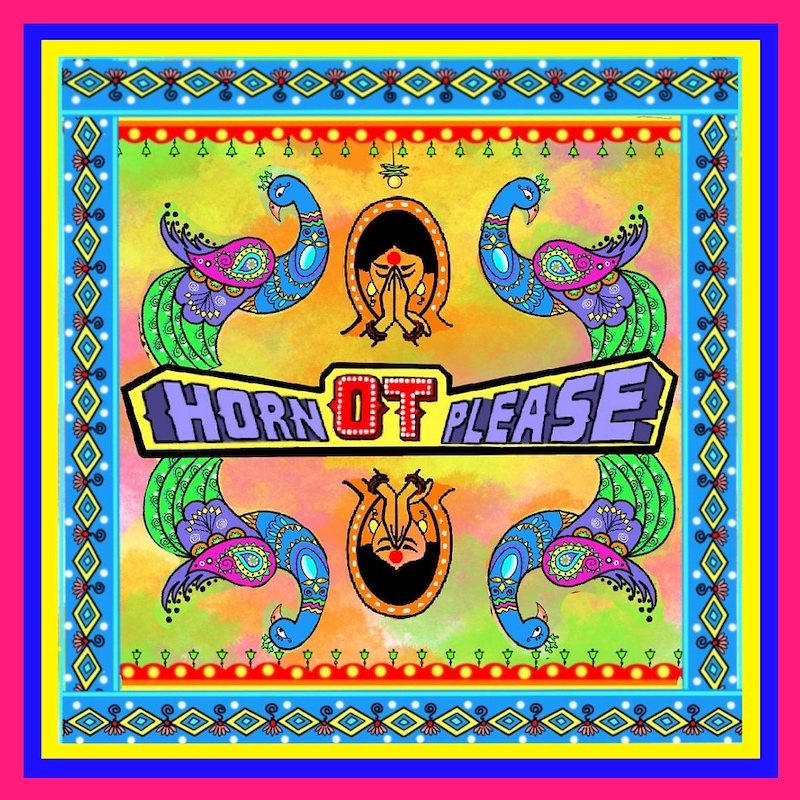Student Blog
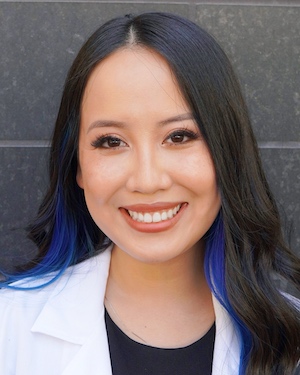
My Enemies Are After Me ⟩
March 2, 2022, by Teresa
Recently, I watched the stuff on Netflix about fraudsters and all I could think was “Wow, what I wouldn’t give to have their confidence.” Not to get anyone to send me $50,000, but because sometimes, it does feel like my enemies are after me . . . and by ‘my enemies,’ I mean the little voice in my head otherwise known as the “imposter.”
I felt like the biggest imposter ever when I was applying to OT school and when I started this program. If I had to rate my imposter syndrome on a scale of 0 (none) to 10 (worst) around this time, I’d put it at a 10. It was exacerbated both by being waitlisted and being fully remote. As I read the student ambassadors’ blogs, started meeting my classmates on Zoom, and learned from our amazing professors, I was simultaneously romanticizing this image of them in my head – that everyone else was so incredible and had it all figured out while I knew I always felt lost. I’d say I felt this way intermittently throughout my entire first year in the program.
In the past year, it’s resolved a lot. After 12 weeks of level 2 fieldwork, I felt my confidence increase as my competency in skills grew. Once we fully returned to campus last semester, I was comforted by hushed whispers from my peers who shared my confusion during classes. And then came two pivotal experiences this semester which mitigated my imposter syndrome significantly:
- An esteemed faculty member spoke to our class and shared that she still experiences imposter syndrome. That was just mind-blowing to me. There . . . was simply . . . no way? Not with all her achievements, success, and publications. Anyways, in OT, we love evidence-based practice, right? This individual urged us to search in our own history for evidence that we are indeed imposters in order to support the voice telling us we’re not good enough, don’t belong, or not ready for something. Here’s the punch line — you won’t find anything. You’re here at USC, doing the thing you set out to do, against all odds that might have stood in your way. The evidence speaks for itself.
- I heard this advice when I needed it most because it came at a time when I felt like other people were doing the romanticizing thing to me which I had been guilty of doing to others in the past. I had never seen myself as someone worthy enough to be looked up to, so to be placed in those situations felt . . . weird. Anyone who knows me knows that words of affirmation make me uncomfortable, which is something I am actively working on receiving better because it’s not me rejecting kind words, it’s the imposter. I want to see myself the way others see I have the potential to be, not in the distorted way the imposter tries to convince me of.
Going back to the baseline established at the start of this blog (which – you guessed it – we LOVE in OT), I’d say I now teeter around maybe 2 or 3. I entered “imposter” into the search bar on our website out of curiosity to see how I should frame this blog post and it returned ten blog hits from ambassadors past and present. They each approach it from a different perspective, which shows how pervasive imposter syndrome can be when you find yourself in a new or different environment that you’re not used to. But I think this also means you’re putting yourself in situations that challenge you to learn things you didn’t know before, experience growth throughout your life, and continue to prove people wrong, including that imposter telling you you’re a fraud. Sometimes, I hope I never rate my imposter syndrome at a 0 out of fear that it will indicate I’ve reached a threshold in my learning. Anyways, what I’m trying to say is you aren’t alone in this feeling. It can be difficult, but try not to compare yourself and your journey to others because we are only able to see what they choose to present to the world. Just give it some time. Both your confidence and competence will increase and with that, maybe you’ll learn to befriend your ‘enemies.’
⋯
A spicy podcast from the land of spices! ⟩
March 1, 2022, by Global Initiatives Team
By Prutha Satpute, OTD USC alumni; Cohost and editor of HOTP
By Sakshi Tickoo, BOTh, Personal Counselor; Cohost and PR head of HOTP
By Varada Pisharody, MsOT, OTR/L; Cohost and CEO of HOTP
Editors Brittany Inouye and Abraham Ramirez
Entry-Level Professional Master’s students
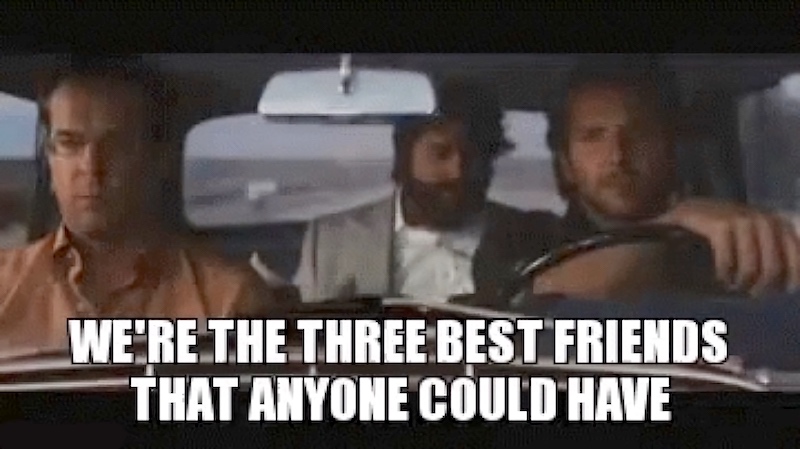
Who are we?
We’re the three best friends
that anybody could have
We’re the three best friends
that anybody could have
And we’ll never ever ever ever
leave each other!
We are three OTs from India, who are at different phases in our (professional) lives, with three completely different personalities, living in 3 different time zones (east coast, west coast, and India). Regardless of these differences we have one thing in common — our love for each other and what we do.
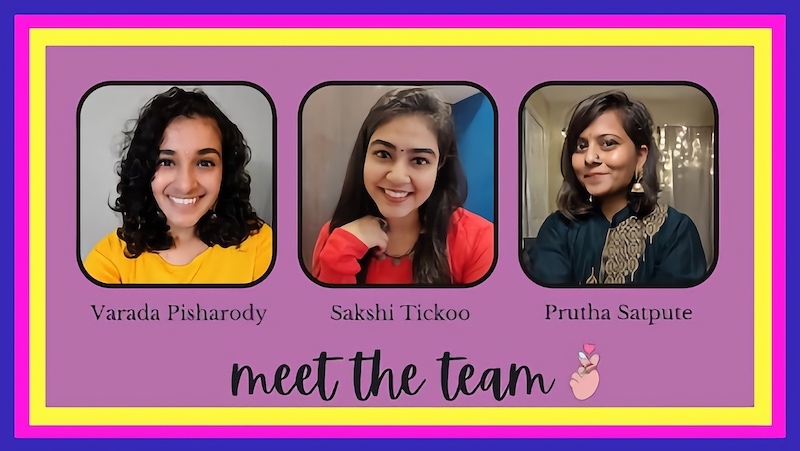
We decked up for a long-distance photoshoot for the launch of the podcast. For more details on who we are check out our website: hornotplease.com
What do we do?
Well, throughout our Bachelor degree years we found ourselves within the grasp of knowing what OT was but never really being able to pinpoint how the core values and fundamentals of our profession related to the everyday lives of people. At the same time, when we would watch Netflix shows or social media trends, we would find these amazing links back to the things we were learning in our textbooks about environmental context and human behavior. The more evidence we found of such links, the more we felt the need to create a platform that would appeal to the minds of OTs who were tired of their mid 20th century Western world-view textbooks. So, in June 2021, we founded Horn OT Please — a student friendly podcast that uses Occupational Science as its backbone to understand OT practices, values, and principles with the help of modern-day educational perspectives. Horn OT Please ended up being the first ever Indian OT podcast available on all listener platforms; this was not only special but it added to the sense of value and responsibility for the work we are doing. So, every week despite our busy schedules and unkind time zone differences (I complain because I wake up at 7am on a Saturday!) we hop on Zoom to study, research, and record our sessions. We try to cover a wide range of topics like:
- Student life
- Ups-downs, perks-disappointments, joys, and wonders of being an OT
- What is OT education like in India and other countries?
- OT Education
- Reforms in OT books and teaching methods
- OT soft skills
- Prepping for the big scary world
- OT Practice
- Non-traditional settings, areas of practice, and interventions
- Personal anecdotes
How do we do it?
Simply reading words on paper did not challenge us to think critically in a client-specific scenario. On the other hand, watching the Oscar winning movie ‘The Father’ gave a visual, auditory, cognitive, mental, and emotional character to the signs and symptoms of Alzheimer’s, making it more real and relatable. We are constantly in search of narratives and stories fictional/non-fictional that can act as a medium for learning and understanding OT concepts. We use scientific manuscripts, journal articles, movies, documentaries, history, art, trends on Instagram, TikTok, and other non-traditional media to blur the line between academic and non-academic learning materials.
Why do we do it?
Because we can. For a long time we waited for OT professionals who could answer our questions and make sense of our fanatical ideas. As the three of us have started diverging into different practice areas and settings, our inquisitiveness has only led to more questions that remain unanswered. Horn OT Please is our safe haven. And we hope that it becomes a space where disparate worlds of thought can come together; challenging OTs globally to think outside the box, and further advance our profession.
If you have any questions or would like to know more you can reach us through our socials — email: .(JavaScript must be enabled to view this email address), Instagram: @hornotplease, website: hornotplease.com.
⋯
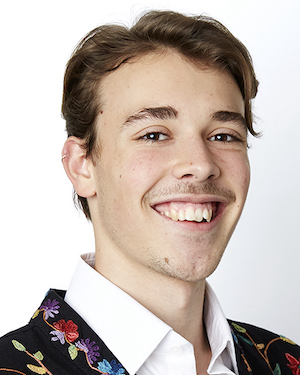
Welcome to the Trojan Family! But first, maybe Trojan Friendship? ⟩
February 28, 2022, by Seth
I have, once again, been thinking about the future and as we all prepare to transition into new chapters, my mind keeps coming back to one part of the experience: making friends.
Much like everything else in life, graduate school is a rollercoaster of experience! There are peaks and valleys, and while you’re slowly ticking your way to the top or racing down the hill, it can be hard to remember there are other people on the ride too. It can be a lonely experience, after all. You may be moving across the country, your friends may now be employed full-time, and said plainly adult relationships can be hard! I have been a graduate student for two years now and I still feel these things sometimes. I’m sure these feelings will continue as I move into my next chapter too, but there are ways that we can put ourselves out there and meet other people! I’ve compiled a list of strategies that I have been tinkering with lately and I hope that in advance of your transition, whatever and wherever it may be, something sticks. The one thing they do have in common, however, is putting yourself out there. The frameworks in place are just that, foundations, and it is up to you to build them up!
Schedule and Protect Your Time
I want to start off with some sage advice my lifestyle redesign course received from Dr. Camille Dieterle this semester. She encouraged us to look at our calendars and see when we were having fun versus our responsibilities. It is so obvious that you never think twice about it before someone points it out. Suddenly, it was like a lightbulb had turned on, “Of course I’m lonely! I go to class, I go to work, I go to sleep and repeat.” Where in that mix am I living my twenties? You may be tempted to acknowledge this and commit to making a change, but you must remember that whatever you schedule for you, make sure to protect it! If you’re going to a museum on Friday, don’t agree to a meeting at that same time. I am two weeks out from living this advice and I have already done more things with my friends within that time than I have all last semester.
Take Advantage of the Structures in Place
This suggestion covers a lot of ground. This could mean joining the social media groups for your academic class, a club meeting, a post-final get-together, or it could be a university-wide event; the campus is your oyster! All of these avenues contain a safety net if you’re finding yourself flying solo. What I mean by this is if you are nervous about showing up alone or you’re more of a wallflower, you’ll always have something to start a conversation about: USC! We often laugh at orientation-style ice breakers, but they exist for a reason. My advice is to start with a compliment (“I love your overalls”), introduce yourself (“I’m Seth, it’s nice to meet you!”), and roll right into the “What’s your major?” conversation (“I’m studying occupational therapy, let me explain what that means . . .” (IYKYK). Did I use this exact conversation just this weekend? Yes. Did I walk away with four new friend phone numbers? Yes! All I have to say is if it ain’t broke, don’t fix it!
Find Your People
I’m not just talking about those with similar hobbies or people you just *vibe* with; I’m talking about dropping your hairpins and stopping the code-switching, I’m talking about finding your People with a capital “P”. I highly encourage you to seek out your cultural student organizations and your communities beyond the campus boundaries. Find the people who lift the weight of your shoulders and nourish your soul in a way that only people who get it, and get you can. They’re out there, I promise!
Keep Your Roots
It may go without saying, but I think it is important to reiterate. You still have all of the friendships you had before graduate school! They may look a little different, but that doesn’t mean they are gone. Don’t be afraid to schedule a weekly check-in phone call or a tri-monthly zoom call (and make sure to protect it!). Keep sending each other those memes, let them crash on your couch when they’re in town, and visit them when you go home. Whatever your transition may bring, know that you’ll still have someone to turn to and that you’ll navigate it together.
After all of these tips I do want to add a caveat: I’m not saying you have to make the bestest of friends. Graduate school may feel long in the moment, but it goes by in the blink of an eye. Do not feel pressured to walk away from the experience with the friendship equivalent of a soulmate (If you do, I love that for you). What I am saying, though, is that it helps to have a shoulder to lean on and someone to celebrate with. It helps to have a friend, no adjective is needed. With that said, to those entering the E-OTD next year, to our incoming BS-OTD students, and to anyone who is going through a transition soon, welcome to the Trojan Friendship and thank you for being a friend.
⋯
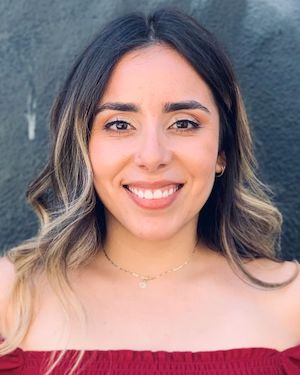
You’re Welcome ⟩
February 26, 2022, by Silvia
Admissions Diversity First-Gen
I say that in the most humble way.
Here’s the thing about being first-gen — or maybe just about me — we’ve been conditioned to feel and express nothing but thankfulness when we’re given anything (an opportunity, admissions acceptance, a scholarship, etc.), rather than saying what we truly know.
“That’s right, I EARNED that, and I DESERVE it. You didn’t just HAND it to me . . . and if we’re being honest, you kinda need me.” Try saying that with your chest next time . . . maybe after you say thank you — but you get what I mean.
As I write this blog, I find myself deleting and rephrasing because I think to myself, “other college students feel that way too,” and that’s the problem. We minimize and sometimes dismiss our feelings trying to be considerate of others. All the typical college student feelz are valid, I am not trying to take that away. What I am saying is that they are compounded by being first-gen — that’s the power of intersectionality.
I don’t just exist as a student. I exist as the first-born and female daughter of Mexican parents — parents who brought me with them when they immigrated so that I could be “first-generation,” though I don’t think that’s what they intended. Mi mamá me dice, “Yo nunca imaginé que ibas a llegar hasta aquí,” and it’s not because she didn’t believe in me, she believes in me more than I believe in myself, it’s because we come from having nothing and knowing nothing. This matters because while many of my peers were enrolled in extracurriculars, sports, being tutored, etc., in the years preceding college applications, I was cleaning houses with my mom. The moment I learned to write and speak English, which was in 3rd grade, I was making my mom’s business cards on a 3x5 piece of paper and answering the phone when people called to inquire about her services. I cleaned houses with my mom from elementary to high school, up until I left for college.
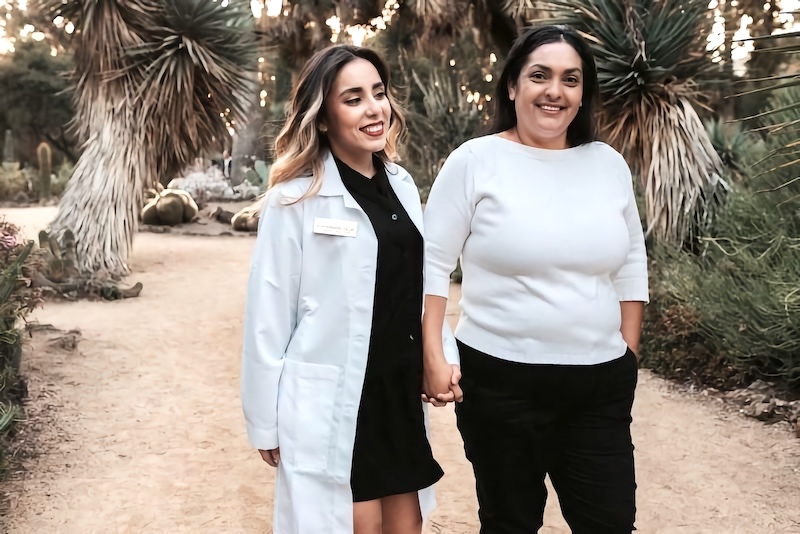
My mother’s daughter, a proud moment.
I, like many of my fellow Latinx and first-gen brothers and sisters, had romanticized going to college and couldn’t wait to experience it. The truth is, experiencing college as a first-gen student is rewarding, but it’s even more exhausting. There’s pride and there’s guilt. We’re not just navigating academics and figuring out financial aid, we’re also simultaneously carrying out roles as our families’ primary interpreters, therapists, mediators, advocates, coparents (IYKYK) and so much more. There’s pride in knowing my siblings get to wear sweaters with the names of universities they actually know about and have visited. The pride in knowing that when teachers ask if said university is where they plan to attend, they get to say, “No. My sister went there for undergrad. She’s at USC getting her master’s now,” is one of the many things being first-gen is all about. That, and the guilt that comes with it as we realize that this is only possible because our parents sacrificed their own dreams for ours.
I believe this is where the internalized superlative feelings of thankfulness stem from. Looking back to where we started, we can’t help but feel thankful for where we are now. But we’re not here because we paid our way in. I will always be thankful for every opportunity I have been given, but I will also acknowledge that it’s not a favor that is being done. Just as I remind myself that I worked for this, and I deserve it, I hope you do too.
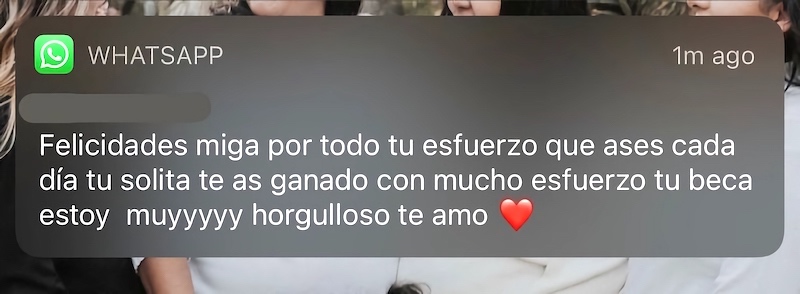
A reminder from my dad: “Congratulations mija for all of the hard work you put in each day. You, by yourself, with all of your effort have won your scholarship. I am very proud. I love you.”
So, to our alma matters (and future ones too, including USC), you’re welcome for choosing you. You’re welcome for our diversity, authenticity, and everything we have brought to the table.
—
I want to leave you with something that I was told and that I hold onto as I reflect on my journey through higher education: “You had nothing, but at the same time you had it all.” — Dr. Rafeedie
⋯
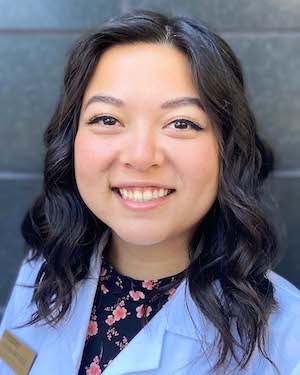
Why the OTD is Right for Me ⟩
February 18, 2022, by Alyssa
Hello! At the time I’m posting this, many of you are likely hearing back from OT schools and deciding where you want to go. If so, congratulations! And welcome to the best career ever.
In the spirit of USC Chan admitting its first-ever class to the new entry-level OTD program, I wanted to share more about why I’m choosing to stay to get my OTD here even though I’m part of the entry-level MA program.
USC was the only entry-level MA program I applied to - the rest were all entry-OTD. Given that I already had a master’s, I figured the next obvious step was to pursue a doctorate, and I didn’t think through the distinction more than that. So when I accepted my offer at USC, I had practically already decided that it was going to be a 3-year commitment.
Now that I am at the end of the MA program here, I’ve done more reflecting on what the OTD means to me and why I think it’s important for my career –
1. Mentorship
My biggest draw to pursuing my OTD is an additional year of mentorship in a clinical setting. Sure, by the end of this year I will have technically completed all of the requirements to start practicing, but I think that the unique structure of an OTD compared to a first year on the job provides more opportunity for guidance and relationship building with your supervisor.
2. Leadership
The OTD also aligns with my interests in leadership roles within the profession. A guest speaker in class mentioned that sometimes a doctorate is required to have a seat at the metaphorical and/or physical decision-making table in some organizations, and I want to be there.
3. Timing
I feel lucky to be able to continue on to getting my OTD now rather than returning after a few years of work. Right now, my role as a student defines many aspects of my life, and I am feeling progressively more ready to close this chapter. Of course I’ll still be learning every day at work from my future colleagues and clients, but I don’t think starting work then returning for another degree would have worked for me.
As a bonus, staying for the OTD means spending another year in close connection with the wonderful friends and professors I’ve built relationships with here in LA 😊
⋯






